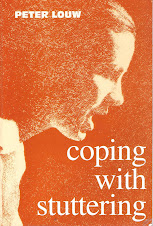Friday, February 12, 2010
Stress - the elephant in the stuttering room
'The elephant in the room' is an expression referring to the strange phenomenon that a hugely relevant or very obvious issue is sometimes ignored, perhaps because it may be politically incorrect or not fashionable to discuss it. Stress, in my view, is the elephant in the stuttering room (see my previous posts on this subject).
I have for many years noticed that my stuttering patterns corresponded to a large extent (not 100%, of course, because we are not programmed machines) to my stress patterns. When I had the flu or a bad cold, my speech deteriorated - but when I drank pain-killing or flu pills which subdued the central nervous system, my speech improved. When I was tired, my fluency levels dropped. In times of important life changes - changing schools, starting a new job, emigrating to a new country, learning a new language, moving to a new house etc. - my speech usually got worse.
It was only after reading Dr. Martin Schwartz's books that it became clear to me that stress levels and stuttering are closely connected. If you stutter, I urge you to also identify your stress patterns and see to what extent they correspond to your stuttering patterns. Identifying a problem and its contributory causes is the first step toward managing a problem.
That, of course, is not to say that stress causes stuttering, because then everybody in the world would stutter. Stress rather seems to impact on an organic component in the human body (the vocal folds, in my opinion), resulting in stuttering.
It follows that stress management should go a long way toward improved speech; and this seems true on a physical as well as a psychological level. For instance, stress can be reduced by jogging, sport or other physical activities, or relaxation exercises, or stress-lowering diets and vitamins; but also by psychological means - eg. developing a problem-solving attitude, positive thinking, a flexible attitude to life, the magic of humour, so-called Type B behaviour (a more relaxed way of living and thinking), stress management in the workplace, stress desensitisation (stress deconditioning), confidence and self-image building, assertiveness training etc. In my book you will find more details.
Stress management, of course, is not enough in managing stuttering. Stress management should be accompanied by using a good fluency technique such as Passive Airflow. But without stress management, the benefits of a fluency technique may be limited, as it is very difficult to apply a fluency technique if you are highly stressed. So stuttering should be tackled by a two-pronged approach, from below (stress management) and from above (fluency technique).
Subscribe to:
Post Comments (Atom)







hehe, this elefant in room is funny picture. It sure seems that way when we're stressed out...
ReplyDeleteYes, I also thought so. I think that the stuttering therapy scene is very much like that - people not seeing what they should see because it doesn't fit in with what they have been taught at university.
ReplyDeleteEvidence has shown over and over again that stuttering is not caused by stress. Stress can accentuate its effects, but is not the main cause of it. Think about it, if stuttering was caused by stress, there would be millions and millions of people with fluency issues, but there are only several million of us.
ReplyDeleteYou are right, of course - in my post I also said that stuttering is not caused by stress alone. Stress is a contributory cause of stuttering, but not the main cause. The correlation between stress and stuttering is not 100%. Sometimes people stutter even when not in stress; and sometimes people don't stutter even when in stress.
ReplyDeleteIn my book, and in other posts on this blog, I have tried to show that stuttering is the result of the fact that approximately 1 - 2% of people have vocal cord muscles that 'freeze' when the tension on them reach a critical point. This is not my idea, it was worked out by Prof Martin Schwartz. So it's not just "stress"; the stress impacts on vocal cord tension.
All stuttering behaviors are just ways of coping with the locked vocal cords. In the course of years, however, the stuttering behaviors (repetitions etc.) become deeply established conditioned reflexes. This means that stuttering is a complex mixture, resulting from time-established habit as well as the generalized stress and localized vocal cord tension of the present.